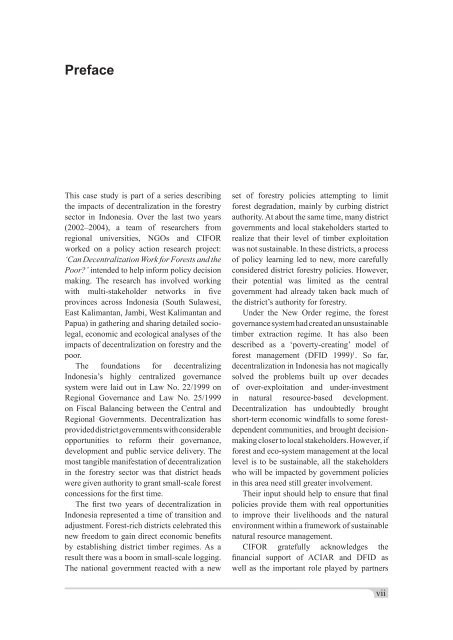Local policy-making mechanisms - Forest Climate Center
Local policy-making mechanisms - Forest Climate Center
Local policy-making mechanisms - Forest Climate Center
Create successful ePaper yourself
Turn your PDF publications into a flip-book with our unique Google optimized e-Paper software.
PrefaceThis case study is part of a series describingthe impacts of decentralization in the forestrysector in Indonesia. Over the last two years(2002–2004), a team of researchers fromregional universities, NGOs and CIFORworked on a <strong>policy</strong> action research project:‘Can Decentralization Work for <strong>Forest</strong>s and thePoor?’ intended to help inform <strong>policy</strong> decision<strong>making</strong>. The research has involved workingwith multi-stakeholder networks in fiveprovinces across Indonesia (South Sulawesi,East Kalimantan, Jambi, West Kalimantan andPapua) in gathering and sharing detailed sociolegal,economic and ecological analyses of theimpacts of decentralization on forestry and thepoor.The foundations for decentralizingIndonesia’s highly centralized governancesystem were laid out in Law No. 22/1999 onRegional Governance and Law No. 25/1999on Fiscal Balancing between the Central andRegional Governments. Decentralization hasprovided district governments with considerableopportunities to reform their governance,development and public service delivery. Themost tangible manifestation of decentralizationin the forestry sector was that district headswere given authority to grant small-scale forestconcessions for the first time.The first two years of decentralization inIndonesia represented a time of transition andadjustment. <strong>Forest</strong>-rich districts celebrated thisnew freedom to gain direct economic benefitsby establishing district timber regimes. As aresult there was a boom in small-scale logging.The national government reacted with a newset of forestry policies attempting to limitforest degradation, mainly by curbing districtauthority. At about the same time, many districtgovernments and local stakeholders started torealize that their level of timber exploitationwas not sustainable. In these districts, a processof <strong>policy</strong> learning led to new, more carefullyconsidered district forestry policies. However,their potential was limited as the centralgovernment had already taken back much ofthe district’s authority for forestry.Under the New Order regime, the forestgovernance system had created an unsustainabletimber extraction regime. It has also beendescribed as a ‘poverty-creating’ model offorest management (DFID 1999) 1 . So far,decentralization in Indonesia has not magicallysolved the problems built up over decadesof over-exploitation and under-investmentin natural resource-based development.Decentralization has undoubtedly broughtshort-term economic windfalls to some forestdependentcommunities, and brought decision<strong>making</strong>closer to local stakeholders. However, ifforest and eco-system management at the locallevel is to be sustainable, all the stakeholderswho will be impacted by government policiesin this area need still greater involvement.Their input should help to ensure that finalpolicies provide them with real opportunitiesto improve their livelihoods and the naturalenvironment within a framework of sustainablenatural resource management.CIFOR gratefully acknowledges thefinancial support of ACIAR and DFID aswell as the important role played by partnersvii

















